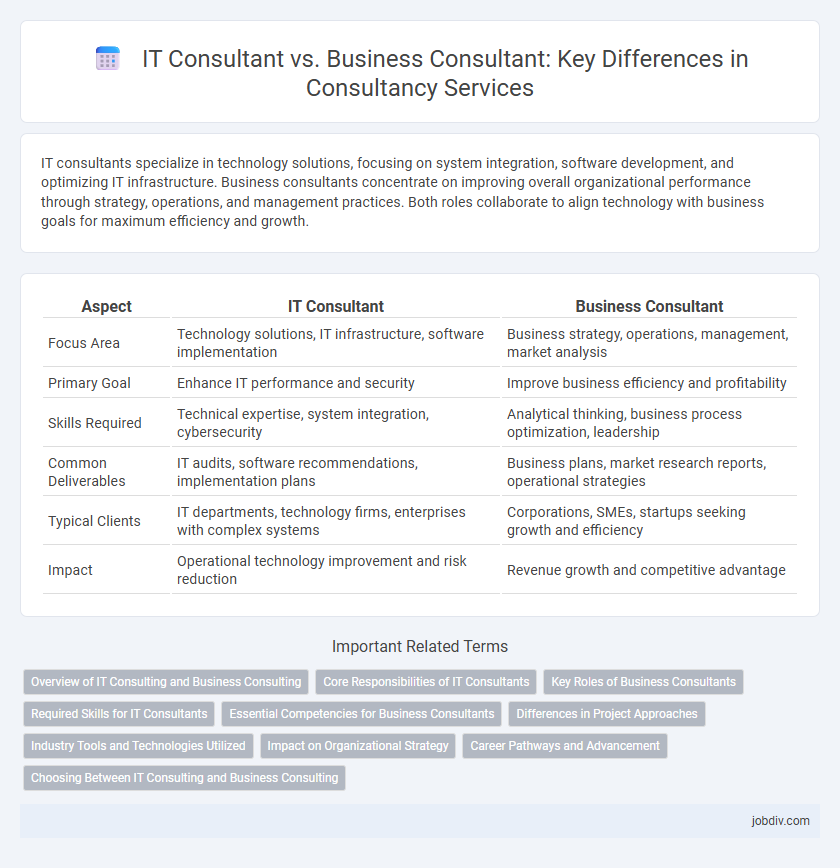IT consultants specialize in technology solutions, focusing on system integration, software development, and optimizing IT infrastructure. Business consultants concentrate on improving overall organizational performance through strategy, operations, and management practices. Both roles collaborate to align technology with business goals for maximum efficiency and growth.
Table of Comparison
| Aspect | IT Consultant | Business Consultant |
|---|---|---|
| Focus Area | Technology solutions, IT infrastructure, software implementation | Business strategy, operations, management, market analysis |
| Primary Goal | Enhance IT performance and security | Improve business efficiency and profitability |
| Skills Required | Technical expertise, system integration, cybersecurity | Analytical thinking, business process optimization, leadership |
| Common Deliverables | IT audits, software recommendations, implementation plans | Business plans, market research reports, operational strategies |
| Typical Clients | IT departments, technology firms, enterprises with complex systems | Corporations, SMEs, startups seeking growth and efficiency |
| Impact | Operational technology improvement and risk reduction | Revenue growth and competitive advantage |
Overview of IT Consulting and Business Consulting
IT consulting focuses on leveraging technology to improve business processes, enhance system integration, and implement software solutions aligned with organizational goals. Business consulting emphasizes strategic planning, operational efficiency, and market analysis to drive overall business growth and competitiveness. Both fields require analytical expertise but differ in the primary scope of technology implementation versus business strategy development.
Core Responsibilities of IT Consultants
IT Consultants specialize in analyzing, designing, and implementing technology solutions that align with a company's business objectives, focusing on system integration, software development, and IT infrastructure optimization. They assess existing IT systems, recommend improvements, manage IT projects, and ensure cybersecurity measures are in place to enhance operational efficiency. Core responsibilities also include troubleshooting technical issues, providing strategic IT advice, and facilitating digital transformation initiatives tailored to organizational needs.
Key Roles of Business Consultants
Business consultants specialize in analyzing organizational structures, identifying inefficiencies, and recommending strategic improvements to drive growth and profitability. They work closely with stakeholders to align business goals, optimize processes, and implement change management initiatives. Unlike IT consultants who focus on technology solutions, business consultants prioritize market analysis, financial planning, and operational strategies to enhance overall business performance.
Required Skills for IT Consultants
IT consultants require a strong foundation in technical skills such as software development, network management, cybersecurity, and systems analysis to design and implement effective technology solutions. Proficiency in programming languages, cloud computing, and data analytics is essential for optimizing IT infrastructure and supporting digital transformation initiatives. Strong problem-solving abilities, communication skills, and knowledge of emerging technologies enable IT consultants to bridge the gap between technical teams and business stakeholders effectively.
Essential Competencies for Business Consultants
Business consultants excel in strategic analysis, change management, and communication skills essential for aligning business goals with market opportunities. They possess expertise in process optimization, financial acumen, and stakeholder engagement to drive organizational growth and efficiency. Mastery of industry-specific knowledge alongside problem-solving capabilities enables business consultants to deliver actionable insights and sustainable solutions.
Differences in Project Approaches
IT consultants primarily focus on technical solutions, emphasizing system architecture, software development, and IT infrastructure optimization to meet project goals. Business consultants concentrate on strategic planning, process improvement, and organizational change management to enhance overall business performance. The differing project approaches reflect IT consultants' task-oriented methodology versus business consultants' holistic, strategy-driven framework.
Industry Tools and Technologies Utilized
IT consultants leverage advanced technologies such as cloud computing platforms, cybersecurity frameworks, and software development tools like Agile and DevOps to optimize technical infrastructure and enhance system integration. Business consultants utilize data analytics software, customer relationship management (CRM) systems, and enterprise resource planning (ERP) tools to improve business processes, strategic planning, and operational efficiency. Both roles require expertise in industry-specific tools, with IT consultants focusing on technical solutions and business consultants emphasizing process optimization and managerial insights.
Impact on Organizational Strategy
An IT Consultant drives organizational strategy by integrating advanced technology solutions that enhance operational efficiency and support digital transformation initiatives. A Business Consultant focuses on aligning organizational goals with market trends, optimizing processes, and improving overall business performance to achieve strategic objectives. Both roles influence strategy by providing specialized expertise, but IT Consultants emphasize technological innovation while Business Consultants prioritize business model optimization.
Career Pathways and Advancement
IT consultants specialize in technology solutions, typically progressing from roles such as systems analyst or software developer to positions like IT project manager or CIO, emphasizing technical expertise and digital transformation leadership. Business consultants focus on strategy, operations, and organizational efficiency, often advancing from analyst or junior consultant roles to senior management or executive advisory positions, highlighting business acumen and stakeholder management. Career pathways for both require continuous learning, with IT consultants needing to master emerging technologies and business consultants developing strong analytical and interpersonal skills for effective decision-making.
Choosing Between IT Consulting and Business Consulting
Choosing between IT consulting and business consulting depends on an organization's primary needs: IT consultants focus on technology solutions, system integration, and cybersecurity, while business consultants emphasize strategy, operations, and organizational change management. Enterprises aiming to enhance digital infrastructure or implement new software platforms benefit from IT consulting expertise, whereas those seeking market expansion, process optimization, or leadership development require business consulting services. Assessing specific challenges and goals ensures alignment with the appropriate consulting specialization for optimal business impact.
IT Consultant vs Business Consultant Infographic

 jobdiv.com
jobdiv.com